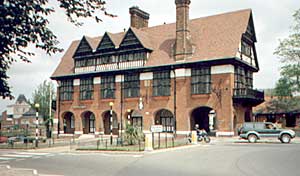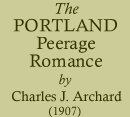CHAPTER IV
THE FARMER DUKE'S DAUGHTER AND THE HOUSE OF COMMONS' SPEAKER.—BECOMES A BENEVOLENT VISCOUNTESS
Place aux dames. Before relating some of the incidents in the careers of the fourth Duke's high-spirited sons, the Marquis of Titchfield and Lord George Bentinck, place must be given to the social triumphs of his third daughter, Lady Charlotte Cavendish-Bentinck.
With all the advantages that wealth and birth could give her among the proud aristocracy of England the love affairs of Lady Charlotte did not run smooth. Her lover was Mr. John Evelyn Denison of Ossington Hall, about twenty miles from Welbeck in the same county of Nottingham. That the young Squire—of well-born family though he was—should aspire to the hand of a Duke's daughter showed no want of spirit on his part. But after all he was only a Commoner, though be had in him the making of the First Commoner of England leading to a still higher elevation on the ladder of social distinction, until be became a peer of the realm, only three degrees lower in rank than the head of the Cavendish-Bentincks himself. The Farmer Duke, simple though his tastes were, did not view with pleasure the courtship of his daughter by the young Squire of Ossington.
Lady Charlotte had mingling in her veins the blood of the highest nobility of three nations. The Cavendishes were among the flower of English chivalry, the Bentincks were renowned in Holland and the Scotts traced their lineage from the pride of Scotland.
The Duke could not bring himself all at once to give Lady Charlotte away to one who had no title.
She was a little over twenty years of age, and when her father refused to hear of the suit of John Evelyn Denison she shed many tears in the presence of her maid. Life to her at this time was by no means so full of sunshine as is usually supposed to be the good fortune of Duke's daughters.
At length Lady Charlotte expressed her intention of eloping with Mr. Denison, and at the prospect of indirectly creating a sensation in high life the Farmer Duke relented.
Lady Charlotte's marriage was her first triumph. Her next was when her husband rose to be Speaker of the House of Commons In 1857 and she herself one of the most important personages at the Court of Queen Victoria.
She had become rich and influential, so that when her husband retired from the Speakership he was in a position to tell the Government of the day that he did not intend to take the pension of £5000 a year, to which he was entitled as an ex-Speaker. His refusal was couched in the following words:—"Though without any pretensions to wealth, I have a private fortune which will suffice, and for the few years of life that remain to me I shall be happier in the feeling that I am not a burden to my fellow-countrymen."
Such self-abnegation is not characteristic of many men. On being elevated to the House of Lords he took the title of Viscount Ossington (after the village of Ossington in Notts, which was his ancestral home) and Lady Charlotte was henceforth known as the Viscountess Ossington.
It was a step downward in rank for her, as her marriage with a Commoner did not degrade her to his status. As a Duke's daughter she was still Lady Charlotte and took precedence of Marchionesses, Countessess, and Viscountesses in the etiquette of royal courts and drawing-rooms.
When her husband became a peer she had to take his rank, and it was one of those indefinable sacrifices associated with noble birth, that, as a Viscountess, she had to give precedence to the wives of Marquises and Earls.
To one who had filled so high a position as Lady Ossington had done in political and social life the descent in status involved by the adoption of the new title was not of much moment. She had been honoured by royalty and had done the honours to royalty, she had tasted all the pleasures that aristocratic Society could provide.
Like her brother, the eccentric Duke, Lady Ossington spent large sums of money, intended, directly or indirectly, to benefit the wage-earning classes.

Ossington Coffee House, Newark.
In a spirit of philanthropy she built a coffee palace at Newark, Notts, a town nine miles from Ossington, at a cost of over £20,000. Her object was to provide a hostel where travellers of humble means could find accommodation for the night, at charges within their means, and that it should be a centre of meeting for Friendly Societies and other bodies in their business and social gatherings. The profits of the establishment she directed to be paid to the hospital.
Another coffee palace on similar lines she erected in Marylebone, London, involving an outlay of several thousands.
South African colonization found in her a sympathetic patroness in days when South Africa was little more than a name to the large majority of Englishmen. At her expense in 1886 a party of twenty-four families was sent to the Wolseley settlement, an estate acquired by purchase, about seventeen miles from King William's Town, where full preparations for their reception had been made by a committee. Within two years and a half the settlement was closed, the cheapness of untaxed drink having changed the settlers from abstainers into drunkards.
The Viscountess was not daunted by this failure to realise her hopes, and in 1888 another attempt at colonization was made under her auspices. Twenty-five families, mostly from Hampshire, sailed for the Cape and formed a new settlement, called by the name of the poet Tennyson. This time the experience of the past was a warning, the enterprise was attended by fairer prospects of success and before her death she had the gratification of knowing that the settlers were contented and happy.
Another of the Duke's daughters was the Dowager Lady Howard de Walden, who became immensely rich on the death of Lady Ossington. Their father had so willed it that if the fifth Duke died without male heirs the London property was to pass to his daughters. Lady Ossington had no children and her rich dowry passed to her sister, who thereby had a double portion. Ossington Hall, after having been for so many years the home of a Duke's daughter, reverted to the Denison family.
From allusions made by Lord George Bentinck to his friends, when he had lost heavily on the turf, it was understood that his mother and sisters, especially Lady Charlotte, were always ready to help him over his difficulties. It is surmised that they knew more of his secrets and of the secrets of the Marquis of Titchfield than the old Farmer Duke who frowned upon betting transactions and was not known to have been involved in the excitements of a duel and gallantries to actresses, not to mention a nebulous secondary existence as Thomas Druce.
Ossington is within easy carriage distance of Welbeck, but the eccentric brother rarely saw his sister and the latter was astonished at the transformation of the Abbey and Welbeck, but the eccentric brother rarely saw his sister and the latter was astonished at the transformation of the Abbey and grounds brought about by him. Before the alteration of her ancestral home she made an Interesting sketch of it, as it was in her father’s lifetime.
